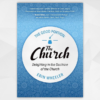Book Review: The Church, by Edmund P. Clowney
Edmund P. Clowney, The Church. IVP Academic, 1995. 336 pages.
How can the church make progress in a confused modern age?
“Only by keeping in step with God’s Word,” answers Edmund Clowney. Within a rich biblical and theological framework, Clowney provides guidance for churches navigating uniquely modern challenges with a clear Evangelical and Reformed account of the doctrine of the church.
Distinctives of his approach include complementarianism, cessationism, Presbyterianism, and an emphasis on evangelism and cultural awareness. Clowney represents excellent historical expressions of such doctrines and attempts biblical defenses of them. You may find, like me, that you have much to learn, even if you aren’t persuaded to change your position.
Born in Philadelphia in 1917, Clowney earned theology degrees from Westminster Theological Seminary, Yale Divinity School, and Wheaton College. He served as a professor at each of the Westminster Seminary campuses and, from 1966 to 1984, as President of Westminster in Philadelphia. Clowney pastored several churches along the way and went home to be with the Lord in 2005. Thus, published in 1995, The Church represents the consummate career of a preeminent pastor-theologian.
Evangelical Ecclesiology
The book is situated within the sometimes-overlooked series Contours of Christian Theology, which offers accessible introductions to foundational doctrines of the Christian faith, especially in the face of contemporary issues (6). As it relates to the doctrine of the church, or ecclesiology, things are especially bleak—most of all perhaps for evangelicals.
Clowney surveys the landscape of late 20th century churches, noting, “Largely because of liberal control of the mainline denominations, evangelicalism took shape apart from the organized church. Growing parachurch organizations enabled individual Christians to unite for service apart from denominational structures” (22). Clowney tellingly labels this “the parachurch tilt of evangelicalism” (23). But Clowney reminds readers of the nature, function, and structure of the church as biblically revealed (9)—because only God’s Word can direct readers in a new age of confusion (25).
A few specific features of the book commend it. First, Clowney grounds his ecclesiology in his trinitarian theology (70). He gives a chapter on Father, Son, and Holy Spirit and how the work of each informs and influences the church. Second, Clowney emphasizes the church as the work of God, not his people. He reminds us that our church is not one assembly first because we voluntarily associate (30). Rather, God gathers his people by his powerful Word, which saves all those who believe in Christ. God assembles his people together around his Son. No doubt, our voluntary association should follow this pattern, thinking God’s thoughts after him. Yet the church is not first where we are, but where the Lord is (31).
Third, Clowney offers a helpful paradigm for understanding the church’s purpose. Our threefold task is worship, nurture (or discipleship), and mission. And yes, “the church’s primary task is to make disciples” (67). Fourth, Clowney makes clear the unity of the church on earth is primarily spiritual or doctrinal and not institutional and visible. That is, the church is “apostolic” in the creedal sense because it is founded upon the apostolic gospel. In other words, “no gospel, no church,” we might say. But importantly, that truth cannot be reversed (73, 78).
Fifth, Clowney explains the biblical requirement of church membership for every Christian. In a stimulating chapter on the Reformation’s marks of a true church, Clowney comments, “Those who say that church membership is not necessary, or even that it is unbiblical, fail to grasp what the New Testament teaches about the church and the administration of the sacraments” (103–104). Finally, some insightful comments on the discernment necessary to exercise discipline in a developing case of apostasy serve as one prescient example of the usefulness of this book for pastors (106).
Presbyterian Matters
Though the book has many strengths, Clowney’s Presbyterianism commits him to a few missteps, in my view. First, at points, he applies the marks of the church (i.e. preaching and ordinances) to denominations instead of congregations (107). Thus, for example, “the church can be expressed at more than one level: in smaller or in larger fellowship,” which for Clowney includes the General Assembly, the regional presbytery, or the congregation.
Second, the book claims, “The story of the church begins with Israel, the Old Testament people of God” (28). Though I could affirm in some sense, we distinguish. The classic covenant theology of Presbyterianism will go on to justify its practice of infant baptism along these lines.
Third, Clowney understands the gift of teaching to distinguish pastors from elders (212). Extrapolating from 1 Timothy 5:17, Presbyterianism has typically held two kinds of elders: teaching and ruling. Yet other passages clearly teach the interchangeability of “pastor” and “elder” (Acts 20:28, 1 Pet. 5:1–4). Not only that, but aren’t all elders required to be “able to teach” in 1 Timothy 3:1–7?
Finally, Clowney’s comments on raising children and the church-school relationship presuppose at least some kind of Presbyterianism (149–153). It’s not clear to me that churches should be thinking about creating a Covenant School as part of their mission on earth, as much as some contexts might seriously suggest the usefulness of that.
Baptistic Concerns
As a Baptist, I remain convinced that Jesus permits only the baptism of those we can discern to be his disciples (Matt. 28:19).[1] Disciples of Jesus show themselves as they accurately and credibly express faith, repentance, and a life in keeping with the calling of the gospel (Phil. 1:27). Likewise, having been united to Christ through faith and brought into church membership through baptism, each member of the church stands in a priestly office by way of his or her relationship to God through Jesus Christ. As such, Jesus is Lord over every individual believer and over every congregation. Thus, the responsibility for doctrine, discipline, and discipleship rests ultimately with the whole congregation.[2]
Clowney rightly points out, “The identity of the church is necessary for the mission of the church. Only as a holy nation called out of darkness into the light of God’s presence can the church discharge its mission” (162). Yet perhaps one committed to regenerate church membership could better live out this commitment practically? Moreover, as beautiful and powerful as Clowney’s descriptions of the sacraments were, it raises questions about their administration to unbelievers, or at least to those whom we can’t responsibly discern to be disciples (271–276).[3]
Conclusion
Despite these important differences, I believe pastors and church members will benefit from reading this book—yes, even Baptist ones! At the risk of creating confusion in a church with practice similar to mine, I wouldn’t give this one away at an evening service.[4] However, pastors will likely find this a useful addition to a pastoral internship, especially as a good summary of what we have in common, along with the best presentation of another denominational approach.
Though we’d have to remain in different churches for the sake of conscience in this age, no doubt, Clowney and I share one gospel and one Lord. He presents a compelling account of the church of Jesus Christ.
* * * * *
[1] Remarkably, Clowney comments, “Baptism administered apart from any credible profession of faith on the part of those claiming God’s promise ceases to function as a mark of the church” (105). Yet the biblical pattern moves one step further, requiring the person being baptized to be professing faith, not merely someone in their genealogy.
[2] Clowney concedes that all must participate in the government of the church, engaging in a healthy every-member ministry of worship, discipleship, and mission (205–207). Yet I wish he’d go further toward congregational government. For more on this congregationalism, see Jonathan Leeman, Understanding the Congregation’s Authority, (B&H 2016).
[3] For an argument outlining this tension in paedobaptist theology, see Shawn Wright’s chapter in Believer’s Baptism.
[4] Perhaps a shorter and more explicitly Baptist book on the church, such as Mark Dever’s The Church: The Gospel Made Visible, would be better for church members looking for something comparable to Clowney’s treatment.








